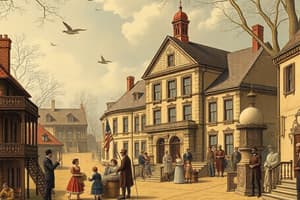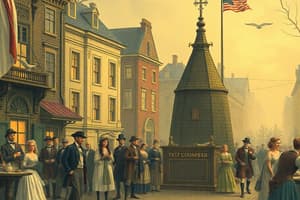Podcast
Questions and Answers
What problems did the Seven Years' War/French & Indian War cause for Great Britain?
What problems did the Seven Years' War/French & Indian War cause for Great Britain?
The biggest problem for England was the debt. Britain's debt jumped from the troops. The colonists didn't believe they should pay for the aftermath of the war or troops.
What were the fundamental beliefs of the Real Whigs? What were the Real Whigs' warnings?
What were the fundamental beliefs of the Real Whigs? What were the Real Whigs' warnings?
The Real Whigs believed powerful governments were dangerous, especially those headed by monarchs, and that standing armies were a threat to liberty. They warned that a corrupt government could destroy adequate representation, impose unjust taxes, or replace jury trials with arbitrary proceedings.
What was the significance of the Stamp Act?
What was the significance of the Stamp Act?
The Stamp Act was the first internal direct tax levied on the American colonies.
From the colonists' perspective, what were the problems with the Stamp Act? (Select all that apply)
From the colonists' perspective, what were the problems with the Stamp Act? (Select all that apply)
What was the significance of Parliament's Declaratory Act?
What was the significance of Parliament's Declaratory Act?
The ______ Act: Parliament passed new taxes on imports on sugar, wine, coffee, and other commodities (increased taxes). Intended to raise money for Britain.
The ______ Act: Parliament passed new taxes on imports on sugar, wine, coffee, and other commodities (increased taxes). Intended to raise money for Britain.
What was the purpose of the Currency Act?
What was the purpose of the Currency Act?
What did the Stamp Act Congress do?
What did the Stamp Act Congress do?
What was the significance of the Declaration of Rights and Grievances?
What was the significance of the Declaration of Rights and Grievances?
What did the Declaration of Rights and Grievances assert?
What did the Declaration of Rights and Grievances assert?
What role did King George III play in the American Revolution?
What role did King George III play in the American Revolution?
What was George Grenville's view on the American colonies?
What was George Grenville's view on the American colonies?
What was the importance of James Otis Jr.'s work, "The Rights of the British Colonies Asserted and Proved"?
What was the importance of James Otis Jr.'s work, "The Rights of the British Colonies Asserted and Proved"?
What is Patrick Henry known for?
What is Patrick Henry known for?
What was the purpose of the Sons of Liberty?
What was the purpose of the Sons of Liberty?
What did Lord Rockingham do?
What did Lord Rockingham do?
What was significant about the Virginia House of Burgesses' response to the passage of the Stamp Act?
What was significant about the Virginia House of Burgesses' response to the passage of the Stamp Act?
How did the Townshend Duties differ from the Navigation Acts? (Select all that apply)
How did the Townshend Duties differ from the Navigation Acts? (Select all that apply)
What were the provisions of the Coercive Acts (also known as the Intolerable Acts)?
What were the provisions of the Coercive Acts (also known as the Intolerable Acts)?
Which of the following were provisions of the Coercive Acts? (Select all that apply)
Which of the following were provisions of the Coercive Acts? (Select all that apply)
What was the role of the East India Company in the events leading up to the American Revolution?
What was the role of the East India Company in the events leading up to the American Revolution?
Who was Charles Townshend and what were the Townshend Duties?
Who was Charles Townshend and what were the Townshend Duties?
What role did Lord North play in the events leading up to the American Revolution?
What role did Lord North play in the events leading up to the American Revolution?
What is Samuel Adams known for?
What is Samuel Adams known for?
What happened during the Daughters of Liberty and women's protests against the Townshend Duties?
What happened during the Daughters of Liberty and women's protests against the Townshend Duties?
What happened during the Boston Massacre?
What happened during the Boston Massacre?
What was the goal of the Boston Tea Party? What was the outcome?
What was the goal of the Boston Tea Party? What was the outcome?
What tasks did the delegates to the Continental Congress face as they gathered in Philadelphia in September 1774?
What tasks did the delegates to the Continental Congress face as they gathered in Philadelphia in September 1774?
What were the two primary accomplishments of the First Continental Congress?
What were the two primary accomplishments of the First Continental Congress?
Why was the event at Lexington in April 1775 considered significant?
Why was the event at Lexington in April 1775 considered significant?
What was the significance of the American Prohibitory Act?
What was the significance of the American Prohibitory Act?
How did Thomas Paine’s Common Sense lay the groundwork for the American Revolution?
How did Thomas Paine’s Common Sense lay the groundwork for the American Revolution?
What was the purpose of the Olive Branch Petition?
What was the purpose of the Olive Branch Petition?
What was the main objective of the Articles of Association?
What was the main objective of the Articles of Association?
What was the purpose of the American Prohibitory Act?
What was the purpose of the American Prohibitory Act?
Who was Thomas Jefferson, and what was his role in the American Declaration of Independence?
Who was Thomas Jefferson, and what was his role in the American Declaration of Independence?
What happened during the Battle of Lexington and Concord?
What happened during the Battle of Lexington and Concord?
What were the key outcomes of the Battle of Bunker Hill?
What were the key outcomes of the Battle of Bunker Hill?
What was the role of the Second Continental Congress?
What was the role of the Second Continental Congress?
What was the purpose of the Declaration of the Causes and Necessity of Taking Up Arms?
What was the purpose of the Declaration of the Causes and Necessity of Taking Up Arms?
Explain why, for the colonists, the military situation was more important than forming a government in 1776.
Explain why, for the colonists, the military situation was more important than forming a government in 1776.
What was the result of the Treaty of Paris for the American colonists?
What was the result of the Treaty of Paris for the American colonists?
What happened to the Native Americans as a result of the Treaty of Paris?
What happened to the Native Americans as a result of the Treaty of Paris?
What were the main outcomes for Great Britain, France, and Spain after the Treaty of Paris?
What were the main outcomes for Great Britain, France, and Spain after the Treaty of Paris?
What were the three main consequences of the American Revolution?
What were the three main consequences of the American Revolution?
What were the five major challenges facing the United States in the immediate aftermath of the American Revolution?
What were the five major challenges facing the United States in the immediate aftermath of the American Revolution?
What fundamental rights were guaranteed by most state constitutions, even without a formal bill of rights?
What fundamental rights were guaranteed by most state constitutions, even without a formal bill of rights?
What powers did the Articles of Confederation grant to the federal government (Congress)? (Select all that apply)
What powers did the Articles of Confederation grant to the federal government (Congress)? (Select all that apply)
What were the provisions of the Articles of Confederation in relation to the states? (Select all that apply)
What were the provisions of the Articles of Confederation in relation to the states? (Select all that apply)
Why was the government under the Articles of Confederation so weak?
Why was the government under the Articles of Confederation so weak?
What was Shay's Rebellion, and how did it contribute to the need to reform the Articles of Confederation?
What was Shay's Rebellion, and how did it contribute to the need to reform the Articles of Confederation?
How did Native Americans respond to the opening of the Northwest Territory? Why?
How did Native Americans respond to the opening of the Northwest Territory? Why?
What were the main disagreements in the debate over representation in Congress, as outlined in the Virginia Plan, the New Jersey Plan, and the Great Compromise?
What were the main disagreements in the debate over representation in Congress, as outlined in the Virginia Plan, the New Jersey Plan, and the Great Compromise?
What was the essential structure of the U.S. government under the Constitution?
What was the essential structure of the U.S. government under the Constitution?
What were the main differences between the Federalists and the Anti-Federalists concerning the U.S. Constitution?
What were the main differences between the Federalists and the Anti-Federalists concerning the U.S. Constitution?
What was the purpose of the Federalist Papers?
What was the purpose of the Federalist Papers?
Who was Edmund Randolph, and what was his role in the formation of the Constitution?
Who was Edmund Randolph, and what was his role in the formation of the Constitution?
What was James Madison's role in the formation of the Constitution?
What was James Madison's role in the formation of the Constitution?
What was William Paterson's role in shaping the Constitution?
What was William Paterson's role in shaping the Constitution?
What was Roger Sherman's role in the formation of the Constitution?
What was Roger Sherman's role in the formation of the Constitution?
Flashcards
Virtual Representation
Virtual Representation
A system where a colonists representative would look out for their particular interests.
Actual Representation
Actual Representation
Representatives were elected by a broader group but still seen as representing everyone's interests.
Salutary Neglect
Salutary Neglect
The British policy of allowing the colonies to ignore most of the British laws.
Sugar Act
Sugar Act
Signup and view all the flashcards
Currency Act
Currency Act
Signup and view all the flashcards
Stamp Act
Stamp Act
Signup and view all the flashcards
Vice-Admiralty Courts
Vice-Admiralty Courts
Signup and view all the flashcards
Stamp Act Congress
Stamp Act Congress
Signup and view all the flashcards
Declaration of Rights and Grievances
Declaration of Rights and Grievances
Signup and view all the flashcards
Declaratory Act
Declaratory Act
Signup and view all the flashcards
Townshend Duties
Townshend Duties
Signup and view all the flashcards
Committees of Correspondence
Committees of Correspondence
Signup and view all the flashcards
East India Company
East India Company
Signup and view all the flashcards
Coercive Acts (aka Intolerable Acts)
Coercive Acts (aka Intolerable Acts)
Signup and view all the flashcards
Boston Port Act
Boston Port Act
Signup and view all the flashcards
Administration of Justice Act
Administration of Justice Act
Signup and view all the flashcards
Massachusetts Government Act
Massachusetts Government Act
Signup and view all the flashcards
Quebec Act
Quebec Act
Signup and view all the flashcards
Quartering Act
Quartering Act
Signup and view all the flashcards
Valley Forge
Valley Forge
Signup and view all the flashcards
Northwest Ordinance
Northwest Ordinance
Signup and view all the flashcards
Articles of Association
Articles of Association
Signup and view all the flashcards
Olive Branch Petition
Olive Branch Petition
Signup and view all the flashcards
American Prohibitory Act
American Prohibitory Act
Signup and view all the flashcards
Declaration of Independence
Declaration of Independence
Signup and view all the flashcards
Virginia Plan
Virginia Plan
Signup and view all the flashcards
New Jersey Plan
New Jersey Plan
Signup and view all the flashcards
Great Compromise
Great Compromise
Signup and view all the flashcards
Checks and Balances
Checks and Balances
Signup and view all the flashcards
Bicameral Legislature
Bicameral Legislature
Signup and view all the flashcards
Proportional Representation
Proportional Representation
Signup and view all the flashcards
Three-Fifths Compromise
Three-Fifths Compromise
Signup and view all the flashcards
Electoral College
Electoral College
Signup and view all the flashcards
Federalists
Federalists
Signup and view all the flashcards
Anti-Federalists
Anti-Federalists
Signup and view all the flashcards
Federalist Papers
Federalist Papers
Signup and view all the flashcards
Bill of Rights
Bill of Rights
Signup and view all the flashcards
Study Notes
Key Concepts
- The Seven Years' War/French and Indian War caused significant debt for Great Britain.
- Colonists resisted paying for war debts and troops.
- Economic consequences of the war greatly impacted the future colonies and the US.
- Real Whigs warned against powerful governments.
- Stamp Act: the first direct internal tax on the colonies, was viewed negatively by colonists
- Declaratory Act: Parliament's power to tax the colonies in all cases.
- Virtual Representation: Colonists would elect representatives to look out for their interests.
- Actual Representation: Representatives elected by a broader group but still representing everyone.
- Salutary Neglect: British policy allowing the colonies to largely ignore British laws.
Terms
- Sugar Act: new taxes on sugar, wine, coffee, and other imports.
- Currency Act: made it illegal for colonies to issue paper money.
- Vice-Admiralty Courts: courts without juries in the colonies.
- Stamp Act Congress: meeting of colony delegations.
- Declaration of Rights and Grievances: colonists felt taxes without consent were unconstitutional.
- Declaratory Act: Parliament's power to tax the colonies.
- King George III: King of England during the American Revolution.
- Prime Minister George Grenville: believed the colonies should be tightly controlled.
- Real Whigs: ordinary people should be alert/careful.
People
- James Otis, Jr.: early advocate for colonial rights
- Patrick Henry: known for "Give me liberty or give me death."
- Sons of Liberty: intercolonial association to curb excesses.
- Lord Rockingham: led the Rockingham Whigs, repealed the Stamp Act
- Charles Townshend: Chancellor of Exchequer, taxed glass, paper, and tea (Townshend Duties)
- Lord North: New Prime Minister, believed Townshend Duties should be repealed.
- Samuel Adams: Boston Tea Party organizer.
Events
- Virginia House of Burgesses' response to the Stamp Act: denied parliament's authority to tax.
- Townshend Duties: new taxes on goods imported into the colonies.
- Coercive Acts, aka Intolerable Acts: punitive measures against Massachusetts.
- Boston Port Act: closing of Boston Harbor.
- Administration of Justice Act: allowed royal officials to move trials outside Massachusetts.
- Massachusetts Government Act: placed colonial government under British control.
- Quebec Act: granted religious tolerance to Catholics in Quebec.
- Quartering Act: permitted British troops to stay in colonial homes.
- Boston Massacre: British soldiers fired into a crowd, killing five people.
- Boston Tea Party: colonists protesting British tea tax by dumping tea into Boston Harbor.
- Continental Congress: meeting of delegates from the colonies.
- Lexington and Concord: first military engagements of the American Revolution..
- Battle of Bunker Hill: British victory with heavy casualties.
Key Concepts (cont.)
- Tasks of Continental Congress delegates: defining grievances, planning resistance, military preparations, and deciding their relationship with Britain.
- Impact of the Continental Congress: two primary accomplishments - Articles of Association (agreement to boycott British goods) and formation of the 2nd Continental Congress.
- Lexington's Significance: start of the American Revolution.
- American Prohibitory Act: declared war on the colonies.
Key Concepts(cont.)
- Problems after the American Revolution: post-war inflation, soldiers' unpaid debts, lack of unity, state-issued currencies, land ownership disputes.
- Powers granted by the Articles of Confederation: declaring war, making peace and treaties, settling disputes, borrowing/printing money, and asking states for funds.
- Weaknesses of the Articles of Confederation: no power to tax or enforce its authorities, which led to weak central government.
- Shays' Rebellion: farmer's uprising highlighting the government's weakness.
- Response by Native Americans to the opening of the Northwest Territory to settlement.
- State constitutional conventions and bills of rights: documents outlining rights.
- Northwest Ordinance, an important precursor for the expansion of the USA.
Key Concepts (cont.)
- The debate over representation in Congress (Virginia Plan, New Jersey Plan, Great Compromise)
- Structure of the US Government: bicameral legislature, proportional representation in the House of Representatives, equal representation in the Senate.
- Federalist and Anti-Federalist positions on the U.S. Constitution.
People (cont.)
- General Thomas Gage
- Paul Revere.
- George Washington/Continental Army
- King George III
- Thomas Paine/Common Sense
- Richard Henry Lee
- Thomas Jefferson
- John Adams
- Abigail Adams
- John Hancock
- William Howe
- Marquis de Lafayette
- King Louis XVI
Events (cont.)
- First Continental Congress
- "Shot heard 'round the world": Battle of Lexington and Concord.
- Battle of Trenton
- Battle of Saratoga
- Battle for Philadelphia
Studying That Suits You
Use AI to generate personalized quizzes and flashcards to suit your learning preferences.




